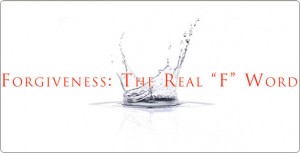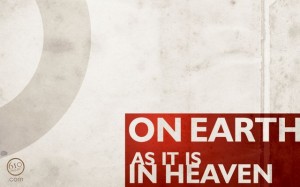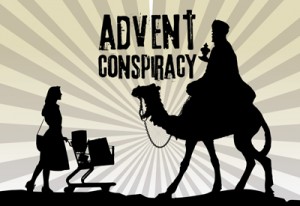 Below is the text from our 5th week looking at the Lord's Prayer. Feel free to respond, engage, ask questions, and push back after you read it. Also below the text of the message is the questions that we dialogued around following the message.
Below is the text from our 5th week looking at the Lord's Prayer. Feel free to respond, engage, ask questions, and push back after you read it. Also below the text of the message is the questions that we dialogued around following the message.
This week marks our 5th week in our 6 week series looking at the Lord’s Prayer found in Matthew 6:9-13. This prayer, which probably should be better entitled The Disciple’s Prayer as I believe it is a prayer that encompasses much of what it means to be a disciple and to live out the Upside Down Kingdom of God.
Over the last 4 weeks we have looked at such Kingdom issues as the Fatherhood of God, being Adopted as sons and daughter’s of God, dreaming about what it would be like if heaven touched down on earth, God’s provision for us, and through us, and forgiveness (from God, towards each other, and in relation to the word Debt and Debtors).
Today we cover Matthew 6:13. Let’s look at the entire prayer and then zero in on verse 13. “This, then, is how you should pray: “‘Our Father in heaven, hallowed be your name, your kingdom come, your will be done, on earth as it is in heaven. Give us today our daily bread. And forgive us our debts, as we also have forgiven our debtors. And lead us not into temptation, but deliver us from the evil one.’ It is the last part, “And lead us not into temptation but deliver us from the evil one” that we’ll be looking at together this morning by using this verse and also Luke 4:1-13. The first thing that should catch our attention is the same thing that stood out to us when we looked at verse 11 and 12, the usage of the word us. As I mentioned before, the concept of the individual is a modern understanding. The Hebraic worldview, of which the Bible is a part, doesn’t have the understanding of the individual as we do. In fact, most of the usages of the word “you” in the Bible are in the plural form and actually refer to “you all,” as in the corporate church family. The fact is that the ancient culture in which the Bible was written tended to think collectively rather than individually. They thought first in groups of people and community rather than in individual terms.
So this prayer, as I mentioned before, is not so much an individual prayer as it is a communal prayer that the community of follower’s of Jesus need to be praying, and living together. Secondly, we have to understand what is meant by temptation. It literally means a test, and not always a solicitation to do evil. God has promised to keep us from any testing that is greater than what we can handle (1 Cor. 10:13). In fact, tradition throughout early Christianity is that testing of one’s faith is a necessary part of discipleship. In fact Jesus whole public “career” was marked by trials of one sort or another. So what Jesus is doing in this prayer, is inviting us to share his own struggles and to experience the same deep of faith that sustained him. You see there is an intimate connection between this part of the prayer, and the ministry of Jesus. With the prayer about deliverance from temptation and the evil one of Matthew 6:13 we are back again with Jesus. Immediately we think of the temptation narratives of Matthew 4:1-11, and Luke 4:1-13, as well as the scene at Gethsemane. We see in those other stories Jesus praying this part of the Lord ’s Prayer to be lead out of temptation, and delivered from evil.
In fact there is a deep connection that I found between the Lord’s Prayer, the subjects that that have been dealing with each week and the story of the temptation of Jesus found in Luke 4:1-13. Let’s go to Luke 4:1-13, read the narrative, and see where the temptations that Jesus faced are the temptations that we face, and how the Lord’s Prayer speaks directly to those temptations. “Jesus, full of the Holy Spirit, left the Jordan and was led by the Spirit into the wilderness, where for forty days he was tempted by the devil. He ate nothing during those days, and at the end of them he was hungry. The devil said to him, “If you are the Son of God, tell this stone to become bread.” Jesus answered, “It is written: ‘Man shall not live on bread alone.’ The devil led him up to a high place and showed him in an instant all the kingdoms of the world. And he said to him, “I will give you all their authority and splendor; it has been given to me, and I can give it to anyone I want to. If you worship me, it will all be yours.” Jesus answered, “It is written: ‘Worship the Lord your God and serve him only.’” The devil led him to Jerusalem and had him stand on the highest point of the temple. “If you are the Son of God,” he said, “throw yourself down from here. For it is written: “‘He will command his angels concerning you to guard you carefully; they will lift you up in their hands, so that you will not strike your foot against a stone.’ Jesus answered, “It is said: ‘Do not put the Lord your God to the test.’ When the devil had finished all this tempting, he left him until an opportune time.” So the first temptation that we find in this text is the temptation to turn stones into bread. Jesus, being hungry, after not eating for 40 days, was surely starving, and Satan knew that. This is why he went that route first. But what is Satan really tempting Jesus with? Is it just to turn stones to bread, or to just eat? Is there more to it? I believe the temptation is the temptation to become our own provider, our own Father if you will. To base our identity in our own power, provision, and position instead of, as we talked about the first week, upon our status as an adoption son or daughter of our heavenly father. And there in lies the connection. Satan wanted Jesus to provide food for himself, and not trust in the provision that God had for him. Satan wanted to have Jesus pray, “I’ll give myself this day my daily bread”, as he wants all of us to pray that. But Jesus was rooted in the prayer, “Give us this day our daily bread.” Jesus knew that ultimate provision (and not just in relation to bread, but also in temptation and strength) comes from the hand of God the Father and not from the self. The second temptation that Satan tested Jesus with was in relation to Jesus giving worship, rule and reign to Satan. Satan says, ““I will give you all their authority and splendor; it has been given to me, and I can give it to anyone I want to. If you worship me, it will all be yours.” What is Satan tempting Jesus with? With being King, and ruling and reigning over the earth, by not going to the Cross, and putting Satan before God the Father. If Jesus would have fallen for that temptation, his prayer later wouldn’t have been, “Thy Kingdom come, Thy will be done on earth as it is in heaven.” It would have been the Kingdom of Satan and not the Kingdom of God if Jesus would have worshipped him. It would have been on earth as it is in hell. No, the rule and reign of Jesus had to go through the temptation, and the trials, and all the way to the cross. Not circuited by worshipping Satan. The last temptation that Jesus had to endure, in this narrative, is the temptation to not trust God’s protection. And in this temptation Satan is smart, and even uses Scripture, to get Jesus to not trust in his heavenly Father. Satan tells him to throw himself off the temple, because after all Scripture does say, “He will command his angels concerning you to guard you carefully; they will lift you up in their hands, so that you will not strike your foot against a stone.’ And this gets at the heart of two parts of the Lords’ prayer, the very beginning, “Our Father who art in heaven.” And the part that we are looking today, “Lead us not into temptation but deliver us from the evil one.” Jesus needed to trust his Heavenly Father and have the strength through His Heavenly Father (and the word of God) to ward off the evil one and the temptation to test the love of His Father. When we look at the root of these temptations that Jesus faced, we notice something about them. It isn’t something that just Jesus faced. No these temptations strike at the heart of what it means to be fully human (as Jesus was). These temptation strike at the heart of what we have been praying together this entire series. Our temptations are no different than Jesus’ temptations. I believe, but I can’t prove it that the words in the Lord’s Prayer came because of his testing in the wilderness as they directly speak to the temptations. You see we all struggle with the temptation to be our own Father, so to speak. To base our Identity and self preservation on ourselves, our power, our wisdom, our positions, instead of praying, “Our Father who art in heaven, hallowed be your name.” Secondly, we don’t want to live under the rule and reign of Jesus and his Kingdom. We want to live under the rule and reign of King Me. We want to pray “My kingdom come, my will be done.” We want to worship ourselves, instead of worshipping the true King, King Jesus. When we pray, “Your Kingdom come, your will be done, on earth as it is in heaven” it is directly confronting the very issue of whose rule and reign are we living under, our own (and by definition, the evil ones) or under the rule and reign of Jesus. Pray that part of the Lord’s Prayer means calling Jesus not only savior but also King and Lord. Thirdly, when we pray “Give us this day our daily bread” we are directly confronting the temptation to provide for ourselves, and think we can do it all. That we are in control. That we don’t need anyone else whether than anyone else is God or even other people. We want to pull ourselves up by our own bootstraps, and make it on our own. Life in the Kingdom of God, and in living out the prayer means trusting that God will give you your daily bread, and also means that he trusts you to also provide that daily bread for other people. So in the Lord’s Prayer we see Jesus directly confronting the struggles and temptations that all humans, including him, face. And in the Lord’s Prayer he has given us words to use to confront the evil one when we are tempted. But what does this mean when the rubber hits the road? What can we learn and apply to our lives about escaping from temptation island through the Lord’s Prayer and the Temptation of Christ in the wilderness? Let’s spend sometime unpacking these stories and their relevance and application to our lives for the next few minutes.
1. What insights, questions, comments, push back, etc.. do you have regarding the Scriptures and the message? 2. What other connections do you see between the Lord’s Prayer, the Tempation of Christ and our own temptations? 3. In what ways, and how, can you resist temptation when it comes? Is there something in the Lord’s Prayer that can help? 4. What is God saying to you and what are you going to do about it? What is God saying to us as a community and what should we do about it?












